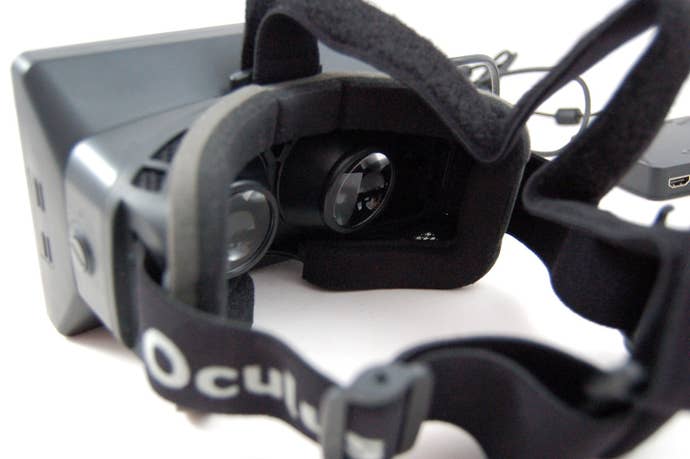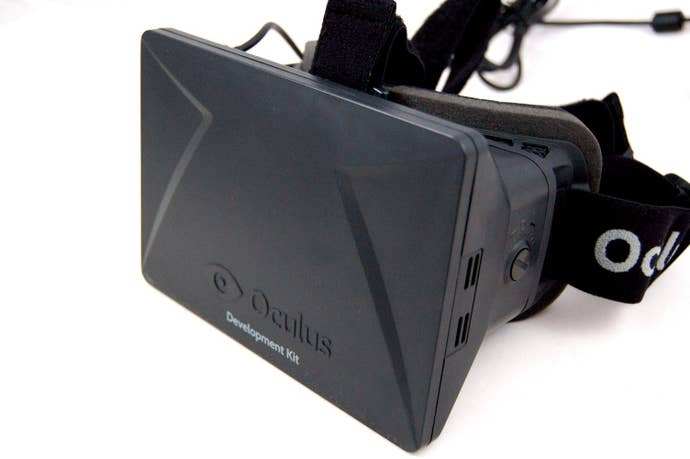Is Facebook's Acquisition of Oculus Good or Bad for Gaming?
Facebook's nabbing of perhaps the coolest tech in gaming has ruffled many feathers. But looking beyond the initial backlash, could there be a long-term upside?
This article first appeared on USgamer, a partner publication of VG247. Some content, such as this article, has been migrated to VG247 for posterity after USgamer's closure - but it has not been edited or further vetted by the VG247 team.
When it comes to offers you can’t refuse, $2bn in cash and stock is one that I imagine few could walk away from. So it comes as no surprise that when Facebook offered that princely sum to Oculus VR to acquire its Rift virtual reality technology, the company sold out. Quite happily I should imagine - but that’s just conjecture. We all know money doesn’t buy happiness, right?
The backlash was immediate and vicious – and quite understandable. The company Kickstarted itself into life on Sept 1, 2012, raising $2.4m from 9522 private party pledges ranging from $10 (1009 backers) to $5000 or more (7 backers). Impressed with the tech, Minecraft creator Notch chipped in $10,000 to help Oculus realize its (virtual) vision. Everything looked cool. Cutting edge. Exciting. Early units were made available to backers, and development continued apace – followed by a small, but growing roster of games that supported the hardware.
Sixteen months later, a second round of cash was injected into the company by Andreessen Horowitz venture capital to the tune of $75m. “We believe Oculus will not only alter the gaming landscape but will redefine fundamental human experiences in areas like film, education, architecture, and design. Oculus is at the tip of the iceberg of its potential, and we’re incredibly excited to help them change the world,” said the firm’s eponymous boss, Andreessen.

Most in the gaming community saw this as a positive thing. There seemed to be no hidden motive beyond simply expediting Rift to retail – a most welcome proposition in the face of the headset's protracted development. But then, a mere three months later, came the unexpected buyout by Facebook – and the inevitable backlash. Many early backers who’d pledged their hard-earned to what was ostensibly seed funding for the nascent Oculus VR company felt that there was a level of bait-and-switch at play. That’s understandable when you read how Oculus described themselves and their goals on their Kickstarter page:
“The Rift is developed by a team of industry veterans passionate about changing the way people experience video games forever. We’ve tackled projects of similar scope: we’ve designed and manufactured consumer hardware; we’ve built well-adopted software development kits for the game industry; and now we’re excited to build a product that can so radically change the way people play their favorite video games.”
That fairly benign statement resonated with many people, but in the face of recent events seems disingenuous – even though that very likely wasn’t the case when it’s written. Either way, the Oculus Kickstarter page has been inundated with negative comments, many along the lines of this one by Rogeraususa, who summed up his feelings, “I am saddened that the independent dream that was Oculus is now selling out to Facebook. Honestly, I feel that every single donor should get a "kickback/refund" from that $2 Billion (they'd still have plenty left over!) to put towards a Kickstarter project that isn't a masquerading golddigger.”
That’s a fair statement in many respects. If I’d thrown my own cash at Oculus and watched them walk off with a frankly unbelievable amount of money, I’d be aggravated too. Like Brian Bedford, who posted, “I backed the original Kickstarter for $10... I'd like my $8200 (.00041%) of that $2 billion Facebook deal now, please. I backed a VR project for games, not a massive social media company's fairly obvious attempt to stay relevant in the face of a waning Facebook and make more money in the long run.”
He continues, “I'm a game developer/artist struggling to even find a job in the face of frequent studio layoffs. Shareholder stake in something I believed in would have helped a LOT right about now, but screw the little people, right? Thanks for that...”

However, while much attention has been lavished on the negative backlash, some backers have responded positively. Chris Cook is one, saying, “So much drama for such GOOD news. Better, cheaper hardware - that's what this means. Plain and simple.”
He represents a fair number of people who are looking beyond Facebook ownership, and are instead anticipating the prospect of a well-made, widely distributed Rift headset. Surely that would be good for gaming?
Quite likely yes, but the one thing to bear in mind are the Facebook shareholders. Now that Oculus is under their auspices, any critical decisions made about Rift will be made first and foremost to benefit them. While that might sound conspiratorial, that is the reality of business – unless Facebook is willing to take a hands-off approach to Oculus and basically take whatever is given them. But really? If you just paid $2bn for something, would you be hands off?
So instead, let’s look at Facebook’s motivations. Echoing Andreessen’s December 2013 statement, Zuckerberg said, “Oculus’ technology opens up the possibility of completely new kinds of experiences. Immersive gaming will be the first, and Oculus already has big plans here that won't be changing and we hope to accelerate. After games, we're going to make Oculus a platform for many other experiences. Imagine enjoying a court side seat at a game, studying in a classroom of students and teachers all over the world or consulting with a doctor face-to-face - just by putting on goggles in your home.”
That certainly sounds positive, but later on the day when he was on a call to investors, Zuckerberg tipped his hand somewhat, describing the prospect of "going shopping in a virtual store where you can touch and explore the products you are interested in just by putting on goggles in your own home."
He believes “Oculus has the potential to be the most social platform ever," and envisions a future where the VR headset "becomes a network where people can be communicating and buying things and virtual goods.” He also believes in a payoff, “there might be advertising in the world, but we need to figure that out down the line.”
Yes indeed. I’m sure they do. And will.

Ultimately, while I can understand the anger and disappointment over what is undoubtedly a sellout, objectively we’re seeing little, if any evidence that this is going to be a bad thing for gaming. Whatever Rift ends up being used for, whether it’s facilitating virtual Farmville, a virtual shoe-shopping spree, or simply enabling you to post pictures of your cat in a virtual gallery for others to stroll through, it’s also going to be a great gaming device.
Facebook have essentially bought a display technology platform – a new kind of monitor they believe can change the way we view and experience the web. The only negative impact it could have on the development of Rift is if it decides to skimp on the tech and produce something inferior to what is currently available now. That seems unlikely. The most likely thing is that the mass-produced Rift will be pretty much what we’re already seeing now, except with Facebook branding - which is probably more damaging to one’s credibility than to gaming
In the meantime, I imagine developers the world over are now eyeing up Rift as the next big thing, because it’s backed by the last big thing. Overnight, it's gone from niche interest product to potential mass market platform. That means more games, not less. Maybe this could be a good thing after all?
